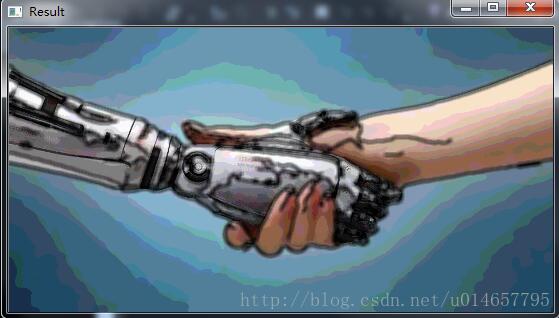本文实例为大家分享了OpenCV实现图像转换为漫画的具体代码,供大家参考,具体内容如下 From 《OpenCV By Example》 1、先canny提取图像的边缘并强化,翻转边缘为黑色,将像素值转换为0-1的
本文实例为大家分享了OpenCV实现图像转换为漫画的具体代码,供大家参考,具体内容如下
From 《OpenCV By Example》
1、先canny提取图像的边缘并强化,翻转边缘为黑色,将像素值转换为0-1的值
2、将图像进行双边滤波处理,然后将像素值缩短为每10个灰度级为一个值
3、将前两步得到的结果相乘,显示结果
#include <iostream>
using namespace std;
#include "opencv2/core.hpp"
#include "opencv2/highgui.hpp"
#include "opencv2/imgproc.hpp"
using namespace cv;
int main()
{
Mat img = imread("1.jpg");
float radius = img.cols > img.rows ? (img.rows / 3) : (img.cols / 3);
const double exponential_e = exp(1.0);
/** EDgES **/
// Apply median filter to remove possible noise
Mat imgMedian;
medianBlur(img, imgMedian, 7);
// Detect edges with canny
Mat imgCanny;
Canny(imgMedian, imgCanny, 50, 150);
// Dilate the edges
Mat kernel = getStructuringElement(MORPH_RECT, Size(2, 2));
dilate(imgCanny, imgCanny, kernel);
// Scale edges values to 1 and invert values
imgCanny = imgCanny / 255;
imgCanny = 1 - imgCanny;
// Use float values to allow multiply between 0 and 1
Mat imgCannyf;
imgCanny.convertTo(imgCannyf, CV_32FC3);
// Blur the edgest to do smooth effect
blur(imgCannyf, imgCannyf, Size(5, 5));
/** COLOR **/
// Apply bilateral filter to homogenizes color
Mat imgBF;
bilateralFilter(img, imgBF, 9, 150.0, 150.0);
// truncate colors
Mat result = imgBF / 25;
result = result * 25;
/** MERgES COLOR + EDgES **/
// Create a 3 channles for edges
Mat imgCanny3c;
Mat cannyChannels[] = { imgCannyf, imgCannyf, imgCannyf };
merge(cannyChannels, 3, imgCanny3c);
// Convert color result to float
Mat resultf;
result.convertTo(resultf, CV_32FC3);
// Multiply color and edges matrices
// cout << imgCanny3c << endl;
multiply(resultf, imgCanny3c, resultf);
// cout << resultf << endl;
// convert to 8 bits color
resultf.convertTo(result, CV_8UC3);
// Show image
imshow("Result", result);
waitKey(0);
return 0;
}
原图为:

效果图为:

以上就是本文的全部内容,希望对大家的学习有所帮助,也希望大家多多支持自由互联。
